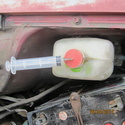Originally Posted By: mk378
When the engine is running there is very high pressure in the cylinders which can force its way through even small leaks in the head gasket. Any serious test of the head gasket is done with the engine running while looking for gasses (especially CO2, which is a distinctive product of combustion) to appear in the cooling system.
Pressurizing through the radiator while cold is good for looking for leaks to the outside such as bad hoses or cracks in the radiator. Head gasket not so much.
Makes sense. MkI gassing detector was no good.It'll be at least a couple of days before I can try the MkII.
When the engine is running there is very high pressure in the cylinders which can force its way through even small leaks in the head gasket. Any serious test of the head gasket is done with the engine running while looking for gasses (especially CO2, which is a distinctive product of combustion) to appear in the cooling system.
Pressurizing through the radiator while cold is good for looking for leaks to the outside such as bad hoses or cracks in the radiator. Head gasket not so much.
Makes sense. MkI gassing detector was no good.It'll be at least a couple of days before I can try the MkII.

